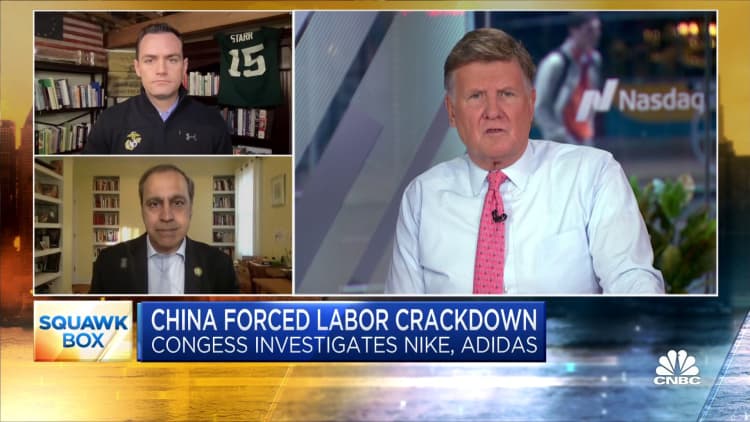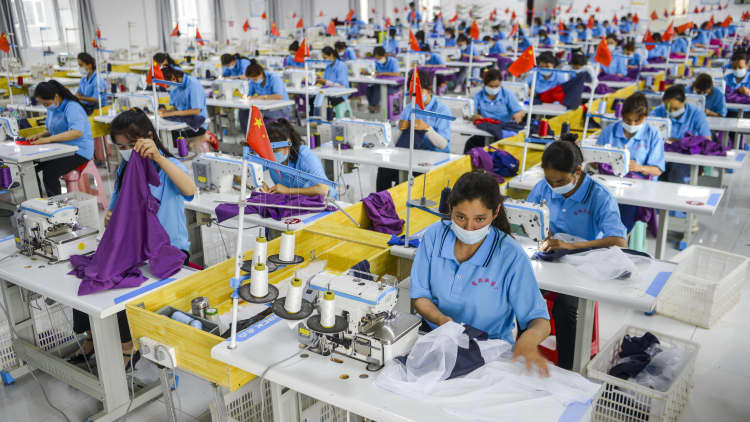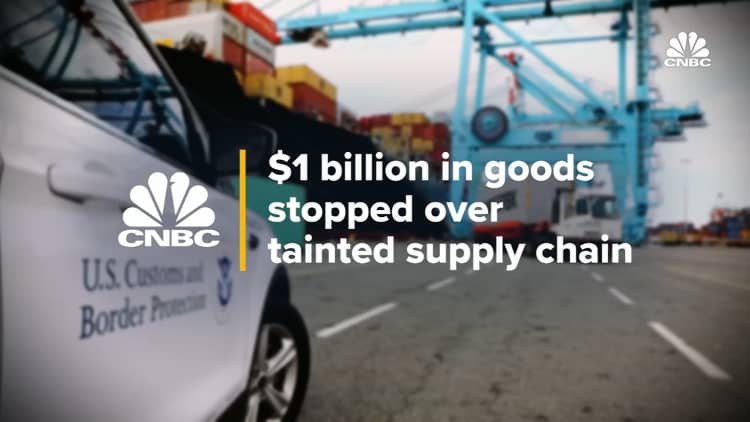
A Yayoi Kusama sculpture is displayed on the top of the Louis Vuitton’s Champs Elysees store, on January 12, 2023 in Paris, France. This year the French Fashion house has launch a second collaboration with Yayoi Kusama.The first one was in 2012. The Yayoi Kusama x Louis Vuitton collection are now available in all Louis Vuitton’s Stores Worldwide. (Photo by Edward Berthelot/Getty Images)
Edward Berthelot | Getty Images
Many of the world’s major fashion brands are failing to address forced labor in their supply chains, according to a report, with French luxury giant LVMH among the worst performers.
The research from KnowTheChain, an organization focused on forced labor in supply chains, analyzed 65 companies for exposure to forced labor risk.
Using benchmarking methodology based on the U.N. Guiding Principles on Business and Human Rights, KnowTheChain said companies scored on average 21/100.
This “demonstrates that in the face of conflict, the climate crisis and economic instability exacerbating the risk of forced labour, company policy and practice is falling short,” the organization’s report, released last month, said.
“They remain largely reactive to human rights violations, rather than evidencing robust, embedded human rights and environmental due diligence practices designed to prevent them,” it added.
Over 20% of the companies assessed scored 5/100 or below, failing to provide and disclose remedies to those whose rights had been violated, KnowTheChain said, calling the result an “indictment in a sector in which human rights violations are consistently uncovered.”
Lululemon, Puma, Adidas the top performers
The benchmark highlighted Canada’s Lululemon as the top performer of 65 companies with a score of 63/100, commending the company for disclosing “markedly stronger human rights due diligence to address forced labour risks in its supply chains.”
“The company has outperformed the SPDR S&P Retail ETF over the past three years and in 2023 experienced double-digit growth in net revenue and gross profit compared with the same period a year ago,” KnowTheChain noted.
“As such, it demonstrates that a corporate strategy which embeds human rights due diligence does not have to come at the cost of long-term sustainable growth or investor returns.”
German sportswear brand Puma (58/100) was the second-top performer, and rival Adidas (55/100) came in third.
Veronique Rochet, senior director of sustainability at Puma, told CNBC that the company has invested a “vast amount of time and resources” for the past 20 years to ensure high environmental, social and governance (ESG) standards.
“For example, PUMA is a member of the Fair Labor Association, which regularly audits and accredits PUMA’s compliance program for compliance with the Fair Labor Association’s Code of Conduct, ensuring we have the systems and procedures in place to successfully uphold fair labor standards, mitigate and remediate violations,” she said.

“The score obtained by PUMA in KnowTheChain report tells us that we are on the right track, but we also see areas and opportunities for improvement moving forward.”
A spokesperson for Adidas told CNBC that the result was “a recognition of our efforts to ensure fair and safe working conditions for workers across adidas’ supply chain – a commitment we have actively driven for over 25 years.”
The company employs a team of around 50 experts around the world to ensure workplace standards are applied and met, and in 2022 conducted more than 1,200 factory audits of suppliers.
“While these latter companies’ (Puma and Adidas) equities have underperformed companies like Nike (48/100) – number six in this year’s benchmark – over the past three years, their higher scores suggest stronger operational practices and business resilience which may be beneficial to forward-looking long-term growth and returns,” the KnowTheChain report said.
At the bottom end of the scale, five companies from India, China, Taiwan, Indonesia and Japan scored 0/100, while three more scored 1/100.

U.S. retailer Foot Locker scored 2/100, and LVMH, the world’s largest luxury goods company, posted a score of 6/100.
Amazon and Walmart both scored 32/100, placing them in the top third-performing of companies overall.
Walmart said it works with suppliers, non-governmental organizations, experts and others to “address root causes of these issues, foster innovative solutions and accelerate adoption at scale.”
“Our business depends on our ability to source responsibly made products, and the well-being of workers in our supply chain as well as our customers’ trust is paramount,” a spokesperson for the company said.
“Our commitment to responsible sourcing and human rights is non-negotiable, and we expect our suppliers to share and uphold our standards.”
Amazon has yet to respond to a CNBC request for comment. Lululemon, Foot Locker, LVMH have also been contacted for comment.
Companies ‘ill-prepared’ for legislation
KnowTheChain flagged that for the most part, companies seemed “ill-prepared for existing and upcoming legislation” requiring them to know and disclose their supply chain risks, with a “concerning disparity” emerging between the number of companies sourcing high-risk raw materials and those demonstrating efforts to identify and disclose risks.
“For example, while 98% of companies produce cotton garments, only 15% of them disclose even partial detail on sourcing countries, putting them at risk of enforcement action from forced labour bans such as the Uyghur Forced Labour Prevention Act and emerging human rights due diligence legislation,” the report added.
“Remedy” was the lowest-scoring theme on the benchmark, with companies scoring an average of 7/100 despite well-documented issues surrounding wage theft and violations to freedom of association in the sector, KnowTheChain said.

Lululemon was the only company that disclosed an example of remedy beyond the first tier of its supply chain, according to the research, and was also the only one to report that it consulted with workers on whether they were satisfied with the remediation provided.
“Purchasing practices” was the second-lowest scoring theme across the benchmark, with an average score of 12/100 and over half of companies not disclosing the adoption of responsible purchasing practices. This includes planning, forecasting or ringfencing labor costs during price negotiations.
Amazon, Walmart, Hermes and LVMH were among the companies scoring zero in this category.
Companies scored an average of 15/100 on the “worker voice” category, the research found, with only 22% disclosing engagement with unions to support freedom of association in their supply chains.
Meanwhile 42% of the companies benchmarked disclosed no relevant supplier or sourcing data, while only 20% disclosed some details about the sourcing countries or tracing efforts for high-risk materials such as cotton, leather and rubber.
